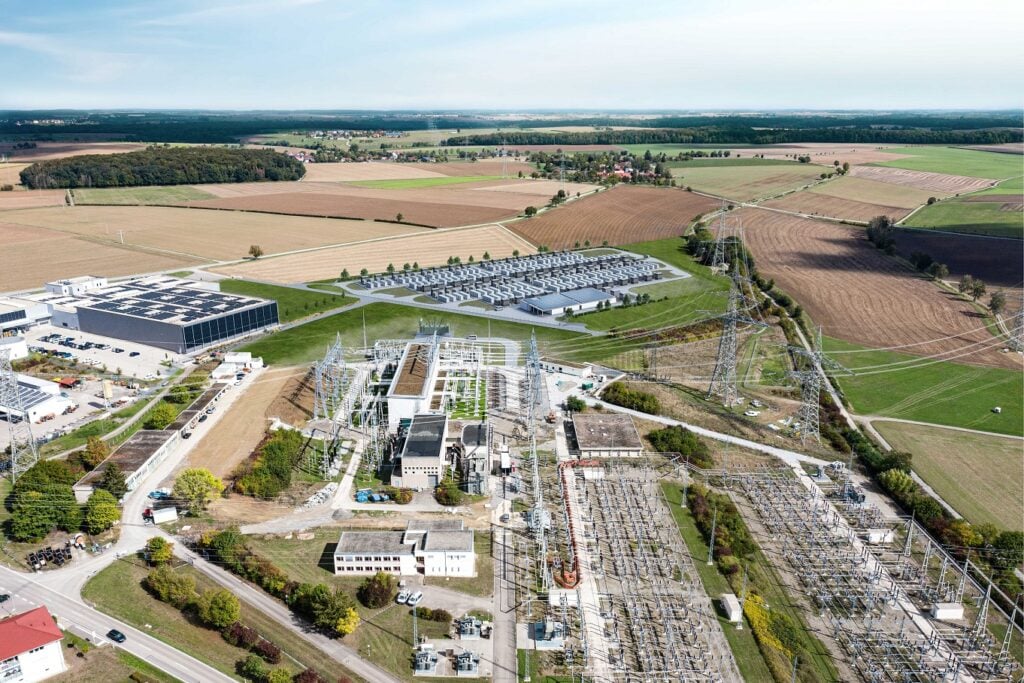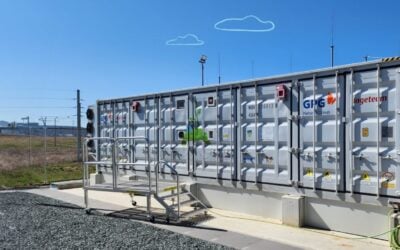
The German government published a strategy for electricity storage in December, with a comment period for trade associations closing yesterday (16 January).
Published on 19 December 2023 by the German Federal Ministry for Economic Affairs and Climate Action (BMWK), the strategy (PDF, in German) is aimed at supporting the ramp up of electricity storage and achieving “optimal integration” of storage into the electricity system.
Enjoy 12 months of exclusive analysis
- Regular insight and analysis of the industry’s biggest developments
- In-depth interviews with the industry’s leading figures
- Annual digital subscription to the PV Tech Power journal
- Discounts on Solar Media’s portfolio of events, in-person and virtual
BMWK said higher shares of electricity storage will be needed to integrate the German renewable energy targets comprising 215GW of solar PV and 145GW of combined offshore and onshore wind by 2030. The ministry identified 18 separate areas it considered appropriate to take measures in to promote storage deployment.
Those include electricity storage’s role in the context of the national Renewable Energy Sources Act (EEG), acceleration of network connections, promoting the production of battery cells and system components, identifying obstacles to the development of pumped hydro energy storage (PHES) and network charging schemes.
While the strategy doesn’t yet spell out specific actions, its release puts electricity storage on the German political agenda for the first time, with the support of the government, said Lars Stephan, senior manager of policy and market development for Fluence on business networking site LinkedIn.
Fluence and four other energy storage-related companies active in the German market recently commissioned a report analysing the projected need for energy storage on the country’s grid. Authored by consultancy Frontier Economics, it found that with a supportive policy framework in place, Germany’s capacity of deployed storage will rise to 15GW/57GWh by 2030 and to 60GW/271GW by 2050.
Frontier Economics also found that those levels of storage deployment could provide around €12 billion (US$13.04 billion) in economic benefit by the mid-Century, and lowering wholesale electricity prices by, on average, €1/MWh between 2030 and 2050.
“Without the flexibility provided by storage, the country will face higher economic costs caused by increasing gas imports and expensive curtailment of renewable generation” Frontier Economics director Dr Christopher Gatzen said.
Frontier Economics and the companies which funded the study (Fluence, developers Baywa r.e., Kyon Energy, ECO STOR and optimiser/trader enspired, recommended that two main actions to be taken include setting a national deployment target for storage and setting aside “corridors” for energy storage facilities.
The study was a follow-up to one Energy-Storage.news interviewed ECO STOR about late last year.
‘Significant opportunity for the country to advance energy transition’
The German battery storage market is already on an upward trajectory, but not at anything like the levels experts and advocates say is needed.
Recent analysis from the Fraunhofer Institute for Solar Energy (Fraunhofer ISE) installed base of battery storage close to doubled last year, going from 4.4GW/6.5GWh of cumulative installs by the end of 2022 to 7.6GW/11.2GWh by the end of 2023. Pumped hydro connected to the grid, totalling 6GW, remained unchanged.
Last year also marked the first time ever that renewables covered the majority of energy consumption in Germany, Fraunhofer ISE said, with 260TWh of wind and solar PV meeting 57.1% of electrical load in 2023, versus 242TWh and 50.2% in the previous year.
Frontier Economics said it expects the growth of energy storage in Germany to mirror the success of solar, and it and BMWK both pointed out that unlike the early days of the solar boom, storage systems are being deployed on an unsubsidised basis.
The market could go much further, the consultancy said, but with measures including the storage strategy, Germany needs the right framework in place.
A Q3 2022 article for our quarterly journal, PV Tech Power (Vol.32) looked at how the growth of renewables and need for energy independence from Russia were among macro drivers for the resurgence of Germany’s utility-scale front-of-the-meter (FTM) storage market.
The market slowed substantially after a brief boom period ending in 2018, when around 200MW of utility-scale installs were recorded. Since then, and after the saturation of the main frequency regulation market, FCR, the Europe-wide secondary reserve opportunity aFFR has been rolled out, and other opportunities include energy trading.
Despite this resurgence, Fluence’s general counsel EMEA and managing director Markus Mayer said far fewer large-scale storage systems are being built than in other markets the company is active in, such as the UK, US or Australia.
“As part of the changing energy landscape, greater deployment of storage represents a significant opportunity for the country to advance energy transition and provide secure access to affordable electricity for consumers,” Mayer said in comments sent to media including Energy-Storage.news.
There is a “great potential” for increasing the uptake of utility-scale storage, but uncertainties in the regulatory and political space “cause unnecessary delays for our customers and their projects, for example, during the approval processes or obtaining network access”.
“We urge politicians to look at ways to create security for investors and better market access for storage,” Mayer said.
“The flexibility provided by storage is fundamental to the success of the energy transition and must become an urgent point on the political agenda… Until recently, storage has not been the focus of the work of the German Federal Government and the Federal Network Agency. However, the energy storage strategy published by the Federal Ministry of Economics at the end of 2023 gives us hope for positive regulatory changes.”
Germany is far from alone among European Union (EU) nations found to be falling short on actions to promote energy storage. According to the Energy Storage Coalition trade group, EU Member States’ draft National Energy and Climate Plans (NECPs), miss what are often “simple steps” that could ensure storage capacity grows to support the bloc’s renewables and energy security goals.
Energy-Storage.news’ publisher Solar Media will host the 9th annual Energy Storage Summit EU in London, 20-21 February 2024. This year it is moving to a larger venue, bringing together Europe’s leading investors, policymakers, developers, utilities, energy buyers and service providers all in one place. Visit the official site for more info.






